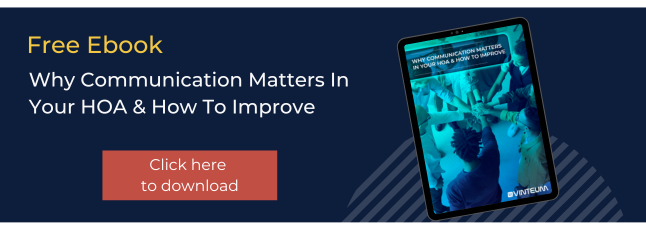Living in an HOA community has its perks, but dealing with noise complaints can be a common challenge. Everyday sounds sometimes lead to neighborly disagreements. In this article, we’ll explore five practical tips to effectively address HOA noise complaints. From understanding guidelines to finding noise reduction solutions, these strategies aim to help maintain a peaceful community. Let’s delve into these actionable steps to promote harmony and resolve noise-related issues in your community.
1. Understanding HOA Noise Guidelines
Understanding the rules set by your HOA is the first step in addressing noise complaints. Take a close look at your community guidelines to understand the acceptable noise levels and the designated quiet hours. It’s important to understand these rules so you know exactly how to address a noise complaint.
It’s also crucial to enforce these HOA rules fairly. Avoid playing favorites or selectively applying them to specific residents. Consistent enforcement is key to preventing potential conflicts and complaints.
For instance, imagine two residents engage in similar noise violations—one consistently playing loud music late at night, and the other doing the same during designated quiet hours. If the board addresses one case promptly but overlooks the other, it could create a perception of unfair treatment.
Consistent rule enforcement ensures that all residents are held to the same standards. It fosters a sense of equality and maintains a harmonious community atmosphere.
2. Act Quickly
Addressing an HOA noise complaint promptly is crucial for maintaining a harmonious community. Here’s why swift action matters:
Preventing Escalation:
-
- Acting quickly helps prevent minor issues from turning into major conflicts. Resolving concerns promptly shows residents that the board takes their roles seriously. This fosters a sense of trust and accountability.
Example: If a loud party becomes a regular occurrence, addressing it swiftly can prevent escalating tensions and maintain a positive community atmosphere.
Preserving Quality of Life:
-
- Noise issues can significantly impact residents’ quality of life. Timely resolution ensures that everyone can enjoy their homes without unnecessary disturbances. This contributes to a more comfortable and pleasant living environment.
Example: A barking dog disrupting neighbors regularly can be swiftly addressed, preserving the overall well-being of the community.
Demonstrating Proactive Leadership
-
- Acting swiftly showcases the board’s proactive approach to problem-solving. This proactive stance encourages residents to trust in the board’s ability to handle various challenges efficiently.
Example: Quickly addressing noise complaints communicates to residents that the board is actively working to create a positive living environment.
Preserving Neighborly Relations
-
- Timely resolution helps preserve good relations among neighbors. When concerns are addressed quickly, residents are more likely to engage in open communication and work together to find compromises.
Example: If a neighbor’s loud music is promptly addressed, it prevents potential resentment and maintains positive relationships within the community.
3. Open Communication Channels
Effective communication is essential for resolving noise-related issues. Initiate a constructive dialogue with residents about noise concerns. Instead of relying solely on written communication, consider organizing community meetings to address concerns directly. By fostering open lines of communication, the board can better understand residents’ perspectives. This helps to work collaboratively towards viable solutions.
The board can play a pivotal role in mediating discussions. Encourage residents to express their concerns and suggest compromises that align with the community’s guidelines.
Creating a friendly space where residents feel at ease expressing concerns is vital. If residents hesitate to talk openly, problems might stick around, leading to potential conflicts. For example, someone bothered by a noisy neighbor might not want to say it out loud but could use HOA communication tools instead.
Keeping conversations open and using modern tools ensures everyone can easily share concerns, making it simpler for the board to find solutions that benefit the whole community.
Tired of handling noise complaints through scattered emails or awkward conversations?

4. Ask for Help
If the community rules are confusing, talking to other board members or past board members can help clear things up.
In more complicated situations, especially when dealing with serious and repeating issues that get lots of complaints, it’s useful to get help from an HOA attorney. For instance, if someone keeps making too much noise, causing problems for others, an attorney can guide the board on what to do within the rules. And if the rules are unclear, an attorney can make things clearer, preventing mistakes.
Another option is hiring a management company. These companies are pros at handling various parts of HOA tasks, including making sure everyone follows the rules.
They can ease the load on the board and make sure the rules are followed consistently, reducing problems and making community management smoother.
5. Communicate regularly
Welcoming New Residents:
Ensuring that new residents are aware of community rules when moving in is essential. The board should make an effort to provide information about acceptable noise levels and quiet hours to newcomers. This proactive approach sets clear expectations from the beginning. It minimizes the likelihood of noise-related conflicts.
Tip: Providing an HOA welcome packet for new residents that highlights community rules, including guidelines on noise, can help set a positive tone for their residency.
Regular Newsletter Updates
Periodic updates in HOA newsletters serve as a consistent reminder of noise regulations. The board can use these platforms to reinforce the importance of respecting noise guidelines and share any relevant updates or reminders.
Tip: Including a section in the monthly newsletter dedicated to noise guidelines and best practices can reinforce awareness among residents.
Holiday Emphasis
Holidays in HOAs often bring increased activities and the potential for increased noise disruptions. It’s crucial to communicate rules and best practices around holidays, such as Thanksgiving, Christmas, or New Year. Remind residents to be mindful of their noise levels during festive seasons. Also, make sure to have rules around noisy decorations. This fosters a considerate and respectful community atmosphere.
Tip: Including a special section in your community’s newsletter on noise guidelines during holidays can serve as a timely reminder.
Digital Platforms and Notices
Using digital platforms improves accessibility to information. The board can leverage these channels to share reminders about noise regulations, creating a continuous and timely dialogue with residents.
Tip: Posting friendly reminders on the community’s online platform can ensure that residents regularly encounter noise guidelines.
Effective communication of rules is a proactive strategy that helps prevent noise-related conflicts. By keeping residents well-informed, the board can reduce the number of HOA noise complaints.
Wrapping up on HOA Noise Complaints
Handling and preventing HOA noise complaints isn’t an easy task. As a board member, you need to make sure to keep residents informed about rules. When you receive a complaint, you need to act quickly and see how it can be solved effectively and fairly. If the situation is escalating, don’t hesitate to ask for help from a management company or an attorney. This will help you mitigate conflicts and foster a harmonious community.
As we’ve seen in this blog post, effective communication is crucial to tackling the issue of HOA noise complaints. Poor communication is often a struggle in community associations. To help you communicate effectively, download our free ebook by clicking below.




